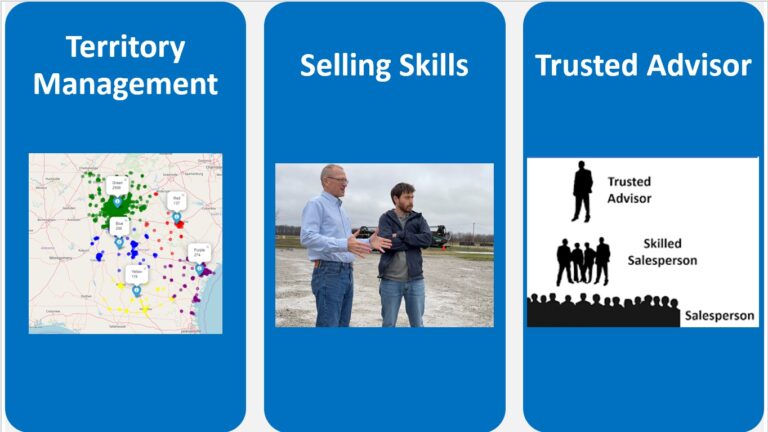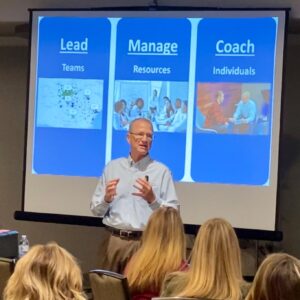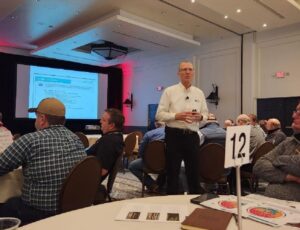Disorganization
Recently, we went through the Top 5 Sales Killers (Fear, Failure, Belief, Mundane, and Comfort). In those five blogs, I outlined how these five emotions kill your sale. Now, we are going to dig into the top 2 aspects that kill salespeople. Obviously, not literally kill. I mean these two aspects kill a salesperson’s sales career. They kill far more sales careers than a lack of closing skills or not asking enough good questions or failing to overcome your customer’s objections.
This may sound strange coming from someone who spends a lot of time training salespeople on topics like Closing, Asking High-Value Questions and Overcoming Objections. However, I preach and live by the fact that the next two blog topics are critical to your success and need to be continuously developed over the course of your selling career.
Salesperson Killer #1: Disorganization
Let’s start off by understanding one important point about organization skills. They are not genetic nor part of your chromosome makeup nor born in you. There’s no DNA component that makes one person organized and another not. Some people come by it easier than others. Some feel the need to be organized more than others. Ultimately, it’s your choice.
With that out of the way, we know it’s possible to be organized if we want to, but why is it so important?
- More organization means more sales calls and more time to prepare for the sales calls you make. Organizing geographically is critical for selling Ag products. We cover large territories and need to plan out our routes. Typically, we plan out our sales calls based on going to see the larger customers. While there, plan ahead and get some appointments around those large accounts. Crisscrossing back and forth across a large territory is not only expensive but kills your ability to make more sales calls.
Once, complaining (bragging) about the fact that I was driving 35-40,000 miles a year to cover my territory, my manager made the hilarious comment, “Why don’t you stop once in a while and sell something?” Still makes me laugh to this day thinking about it. But it’s true. We sort of brag/complain about how busy we are and how many miles we drive. Never bragging that we organized our routes and grew our sales by calling on more accounts.
- organization allows for forward planning, which is another area that brings down the best of us in sales. Ever go on an important sales call and forget to prepare or forget to bring something needed to the call, like the product sample you are selling or the pricing information that’s back in your office? What was your excuse? “I got busy and I ran out of my office in a hurry, and my kids are in sports and….” We get it, you’re busy. So is your prospect. It’s your job to be organized and have systems in place to not forget to be on time or to bring the necessary information to the sales call. Most of us that sell Ag products have our office in our home, which might be many miles from our nearest production facility. When we need samples, a few bags or replacement products, we have to drive into the production facility to get them.
This article is about the importance of being organized. For more tips on How to be organized, see these two articles:
Part 1 – Organize your way to success in your Ag sales territory
And
Part 2 – Organize your way to success in your Ag sales territory
Make sure you have everything you need for the foreseeable future when you do make the trip to the production facility. Burning 2 hours to go back to the feed mill to get samples just killed 25% of your day (in an 8-hour day). That time could have been spent on a couple more farm calls. It could also mean you won’t have enough time to make the original sales call you planned on. If so, now what to do? Since you missed your appointment, you will have to reschedule it, losing the opportunity for a sale today. Now you can either make some sales calls without appointments, which is taboo in some selling situations or you can stay in your home office and have an office day. In summary, this type of day could be described as, “Lost opportunity due to disorganization.” I know this happens once in a while, but if it’s happening often, then you have a problem. Your disorganization is killing your effective selling time, which is the amount of time you are actually in front of a qualified customer. A qualified customer is one that has the ability to buy from you.
- More organized salespeople drop the ball less often. Are the crop & livestock producers that you call on busy? Do the feed store owners, ag retailers or precision ag managers you call on seem so busy they barely have time for a sit-down meeting to look at your products? Of course, the answer is “yes”. We’re all busy. Too busy taking care of our customers to think about potential vendors, which is what you are to your customer. I know you are a consultant and use consultative selling techniques and don’t like to think of yourself as a vendor. So do I. However, keep in mind the basic premise of what happens. You sell a product to your customer for money. A farmer or agribusiness owner has many vendors and most likely many more vendors that want to sell him. In a recent training session, a participant shared that a dairy producer told him he was the fourth feed salesman that day! So, don’t take it personally if they don’t give you a call right back or don’t remember your products or don’t remember why they gave you an appointment in the first place. That’s your job. Make your information simple and easy to remember. Then keep track of the Follow-Up process.
For agribusiness selling, rarely do we sell a customer on the first sales call. I’d venture to say that it takes 3-5 sales calls to get a farmer to try one of your products. Add to the mix that agribusiness is seasonal and you can have a lengthy selling process that spans weeks, months or even years. If you miss the planting window, you have to wait a whole year to get your product on the farm. To stay relevant and top of mind to your prospect for six months to a year takes organization. To stay relevant and top of mind for 30-45 prospects takes a system. And by system, I mean a computer system. It might be Excel or Word or possibly one of the many CRM programs out today. Whatever you use, it has to keep you organized to move prospects through your sales funnel.
It takes outstanding follow-up skills to sell a busy customer
and
It takes organization to achieve outstanding follow-up
Why does it take multiple calls on producers before they buy? First, they need time to build trust. They already have a trusted relationship with their current provider of feed, agronomy or equipment. This is the first time they are meeting you. They are not going to drop their current supplier because you have an amazing PowerPoint with ROI calculated out and multiple data references. They are sizing you up for your ability to help them. Don’t ruin this process by failing to follow up with them when they told you to. Secondly, they most likely feel loyalty to their current provider. Asking them to toss out that provider and install all of your products is not only risky but will make your prospect skeptical of your judgment. Instead, use the crawl-walk-run technique of selling them. Propose a safe product to try first, one that you know will get good results for the producer. I like to call this a “Gateway Product”. It’s even better when my competitor doesn’t have a product in this category. Depending on your products, this might be a free trial or putting your product on one field or in one barn of animals.
This step allows your prospect to get a feel for working with you. From there, you can move forward with bigger investments in your products. The important point here is to keep track of the steps in this selling process and make sure you are following up when you need to. If the information is in a file folder in your office somewhere or buried in the notes of your spiral notebook you carry on farm calls, you are going to spend an enormous amount of time to keep all the balls in the air for 30-45 prospects.
If you want to get a handle on your organizational skills, one of the best ways to start is to time block. Take three or four days and write down what you did each day in one-hour time blocks. Get specific on what you do in your office and other non-customer locations like your production facility. Write down how much time you spend on nonessential emails or searching for something in your files or rewriting a proposal because you didn’t save the format in your computer. Log the number of hours you spend fighting fires on aspects you should have planned for in advance. Take a few minutes and rough plot your driving routes for last week. Does it look like a logical pattern or does it look like you crisscrossed the territory each day?
Now go back and review how much time you can save by routing your sales calls better or not spending as much time in the office.
When I’ve done this with salespeople, it’s not uncommon to find 20-30% of their time could have been spent on more productive selling activities. It’s that 20-30% decrease in efficiency that kills a sales career for many.
If you found this to be helpful, forward on to someone you know who might also appreciate it. Maybe that fellow salesperson who is slightly disorganized and complains(brags) about how busy they are.
Next, we deal with salesperson killer #2.




